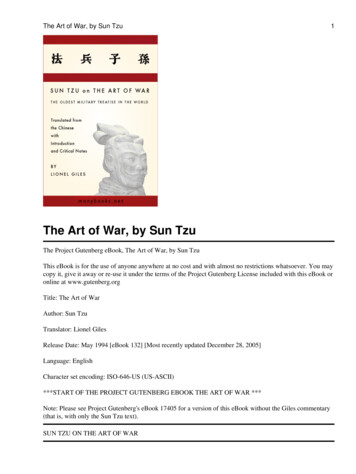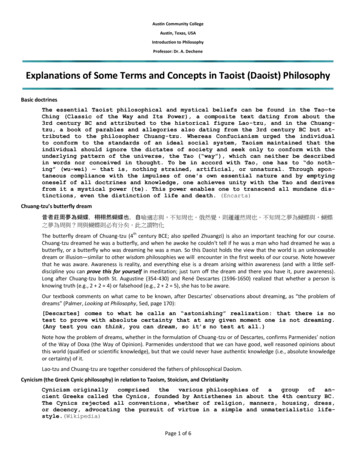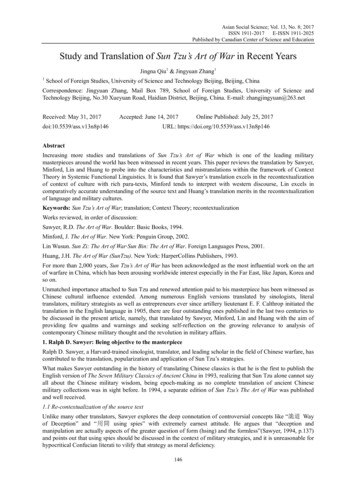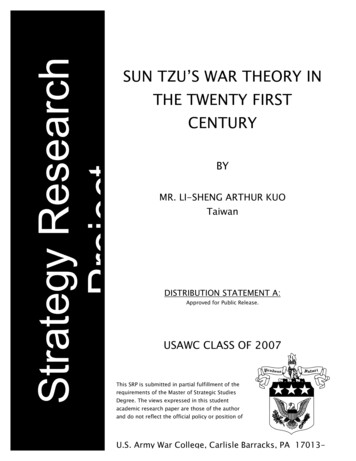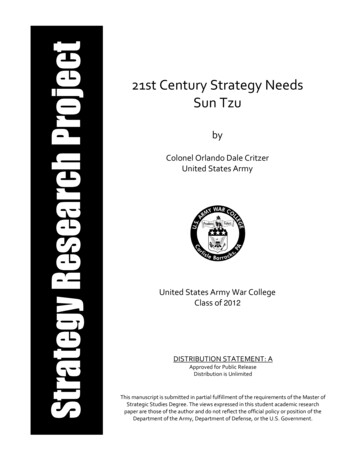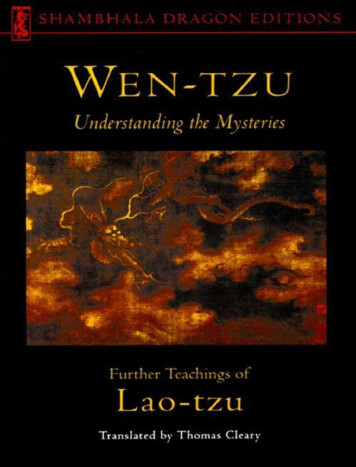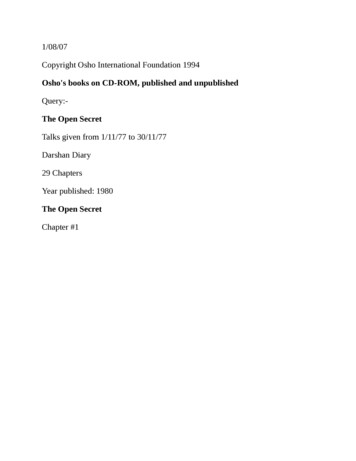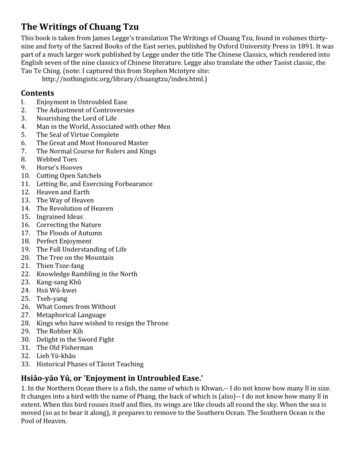
Transcription
The Writings of Chuang TzuThis book is taken from James Legge's translation The Writings of Chuang Tzu, found in volumes thirty‐nine and forty of the Sacred Books of the East series, published by Oxford University Press in 1891. It waspart of a much larger work published by Legge under the title The Chinese Classics, which rendered intoEnglish seven of the nine classics of Chinese literature. Legge also translate the other Taoist classic, theTao Te Ching. (note: I captured this from Stephen Mcintyre .32.33.Enjoyment in Untroubled EaseThe Adjustment of ControversiesNourishing the Lord of LifeMan in the World, Associated with other MenThe Seal of Virtue CompleteThe Great and Most Honoured MasterThe Normal Course for Rulers and KingsWebbed ToesHorse's HoovesCutting Open SatchelsLetting Be, and Exercising ForbearanceHeaven and EarthThe Way of HeavenThe Revolution of HeavenIngrained IdeasCorrecting the NatureThe Floods of AutumnPerfect EnjoymentThe Full Understanding of LifeThe Tree on the MountainThien Tsze‐fangKnowledge Rambling in the NorthKang‐sang KhûHsü Wû‐kweiTseh‐yangWhat Comes from WithoutMetaphorical LanguageKings who have wished to resign the ThroneThe Robber KihDelight in the Sword FightThe Old FishermanLieh Yü‐khâuHistorical Phases of Tâoist TeachingHsiâo-yâo Yû, or 'Enjoyment in Untroubled Ease.'1. In the Northern Ocean there is a fish, the name of which is Khwan,‐‐ I do not know how many lî in size.It changes into a bird with the name of Phang, the back of which is (also)‐‐ I do not know how many lî inextent. When this bird rouses itself and flies, its wings are like clouds all round the sky. When the sea ismoved (so as to bear it along), it prepares to remove to the Southern Ocean. The Southern Ocean is thePool of Heaven.
There is the (book called) Khî Hsieh,‐‐ a record of marvels. We have in it these words:‐‐ 'When the phangis removing to the Southern Ocean it flaps (its wings) on the water for 3000 lî. Then it ascends on awhirlwind 90,000 lî, and it rests only at the end of six months.' (But similar to this is the movement of thebreezes which we call) the horses of the fields, of the dust (which quivers in the sunbeams), and of livingthings as they are blown against one another by the air. Is its azure the proper colour of the sky? Or is itoccasioned by its distance and illimitable extent? If one were looking down (from above), the very sameappearance would just meet his view.2. And moreover, (to speak of) the accumulation of water;‐‐ if it be not great, it will not have strength tosupport a large boat. Upset a cup of water in a cavity, and a straw will float on it as if it were a boat. Placea cup in it, and it will stick fast;‐‐ the water is shallow and the boat is large. (So it is with) theaccumulation of wind; if it be not great, it will not have strength to support great wings. Therefore (thephang ascended to) the height of 90,000 lî, and there was such a mass of wind beneath it; thenceforth theaccumulation of wind was sufficient. As it seemed to bear the blue sky on its back, and there was nothingto obstruct or arrest its course, it could pursue its way to the South.A cicada and a little dove laughed at it, saying, 'We make an effort and fly towards an elm or sapanwoodtree; and sometimes before we reach it, we can do no more but drop to the ground. Of what use is it forthis (creature) to rise 90,000 lî, and make for the South?' He who goes to the grassy suburbs, returning tothe third meal (of the day), will have his belly as full as when he set out; he who goes to a distance of 100lî will have to pound his grain where he stops for the night; he who goes a thousand lî, will have to carrywith him provisions for three months. What should these two small creatures know about the matter?The knowledge of that which is small does not reach to that which is great; (the experience of) a fewyears does not reach to that of many. How do we know that it is so? The mushroom of a morning does notknow (what takes place between) the beginning and end of a month; the short‐lived cicada does notknow (what takes place between) the spring and autumn. These are instances of a short term of life. Inthe south of Khû there is the (tree) called Ming‐ling, whose spring is 500 years, and its autumn the same;in high antiquity there was that called Tâ‐khun, whose spring was 8000 years, and its autumn the same.And Phang Tsu is the one man renowned to the present day for his length of life:‐‐ if all men were (towish) to match him, would they not be miserable?3. In the questions put by Thang to Kî we have similar statements:‐‐ 'In the bare and barren north there isthe dark and vast ocean,‐‐ the Pool of Heaven. In it there is a fish, several thousand lî in breadth, while noone knows its length. Its name is the khwan. There is (also) a bird named the phang; its back is like theThâi mountain, while its wings are like clouds all round the sky. On a whirlwind it mounts upwards as onthe whorls of a goat's horn for 90,000 lî, till, far removed from the cloudy vapours, it bears on its back theblue sky, and then it shapes its course for the South, and proceeds to the ocean there.' A quail by the sideof a marsh laughed at it, and said, 'Where is it going to? I spring up with a bound, and come down againwhen I have reached but a few fathoms, and then fly about among the brushwood and bushes; and this isthe perfection of flying. Where is that creature going to?' This shows the difference between the small andthe great.Thus it is that men, whose wisdom is sufficient for the duties of some one office, or whose conduct willsecure harmony in some one district, or whose virtue is befitting a ruler so that they could efficientlygovern some one state, are sure to look on themselves in this manner (like the quail), and yet Yung‐tszeof Sung would have smiled and laughed at them. (This Yung‐tsze), though the whole world should havepraised him, would not for that have stimulated himself to greater endeavour, and though the wholeworld should have condemned him, would not have exercised any more repression of his course; so fixedwas he in the difference between the internal (judgment of himself) and the external (judgment ofothers), so distinctly had he marked out the bounding limit of glory and disgrace. Here, however, hestopped. His place in the world indeed had become indifferent to him, but still he had not planted himselffirmly (in the right position).
There was Lieh‐tsze, who rode on the wind and pursued his way, with an admirable indifference (to allexternal things), returning, however, after fifteen days, (to his place). In regard to the things that (aresupposed to) contribute to happiness, he was free from all endeavours to obtain them; but though he hadnot to walk, there was still something for which he had to wait. But suppose one who mounts on (theether of) heaven and earth in its normal operation, and drives along the six elemental energies of thechanging (seasons), thus enjoying himself in the illimitable,‐‐ what has he to wait for? Therefore it is said,'The Perfect man has no (thought of) self; the Spirit‐like man, none of merit; the Sagely‐minded man,none of fame.'4. Yâo, proposing to resign the throne to Hsü Yû, said, 'When the sun and moon have come forth, if thetorches have not been put out, would it not be difficult for them to give light? When the seasonal rains arecoming down, if we still keep watering the ground, will not our toil be labour lost for all the good it willdo? Do you, Master, stand forth (as sovereign), and the kinadorn will (at once) be well governed. If I still(continue to) preside over it, I must look on myself as vainly occupying the place;‐‐ I beg to resign thethrone to you.' Hsü Yû said, 'You, Sir, govern the kingdom, and the kingdom is well governed. If I in thesecircumstances take your place, shall I not be doing so for the sake of the name? But the name is but theguest of the reality;‐‐ shall I be playing the part of the guest? The tailor‐bird makes its nest in the deepforest, but only uses a single branch; the mole drinks from the Ho, but only takes what fills its belly.Return and rest in being ruler,‐‐ I will have nothing to do with the throne. Though the cook were notattending to his kitchen, the representative of the dead and the officer of prayer would not leave theircups and stands to take his place.'5. Kien Wû asked Lien Shû, saying, 'I heard Khieh‐yü talking words which were great, but had nothingcorresponding to them (in reality);‐‐ once gone, they could not be brought back. I was frightened bythem;‐‐ they were like the Milky Way which cannot be traced to its beginning or end. They had noconnexion with one another, and were not akin to the experiences of men.' 'What were his words?' askedLien Shû, and the other replied, (He said) that 'Far away on the hill of Kû‐shih there dwelt a Spirit‐likeman whose flesh and skin were (smooth) as ice and (white) as snow; that his manner was elegant anddelicate as that of a virgin; that he did not eat any of the five grains, but inhaled the wind and drank thedew; that he mounted on the clouds, drove along the flying dragons, rambling and enjoying himselfbeyond the four seas; that by the concentration of his spirit‐like powers he could save men from diseaseand pestilence, and secure every year a plentiful harvest.' These words appeared to me wild andincoherent and I did not believe them. 'So it is,' said Lien Shû. 'The blind have no perception of the beautyof elegant figures, nor the deaf of the sound of bells and drums. But is it only the bodily senses of whichdeafness and blindness can be predicated ? There is also a similar defect in the intelligence; and of thisyour words supply an illustration in yourself. That man, with those attributes, though all things were onemass of confusion, and he heard in that condition the whole world crying out to him to be rectified, wouldnot have to address himself laboriously to the task, as if it were his business to rectify the world. Nothingcould hurt that man; the greatest floods, reaching to the sky, could not drown him, nor would he feel thefervour of the greatest heats melting metals and stones till they flowed, and scorching all the ground andhills. From the dust and chaff of himself, he could still mould and fashion Yâos and Shuns;‐‐ how shouldhe be willing to occupy himself with things?'6. A man of Sung, who dealt in the ceremonial caps (of Yin), went with them to Yüeh, the people of whichcut off their hair and tattooed their bodies, so that they had no use for them. Yâo ruled the people of thekingdom, and maintained a perfect government within the four seas. Having gone to see the four (Perfect)Ones on the distant hill of Kû‐shih, when (he returned to his capital) on the south of the Fan water, histhrone appeared no more to his deep‐sunk oblivious eyes.7. Hui‐tsze told Kwang‐tsze, saying, 'The king of Wei sent me some seeds of a large calabash, which Isowed. The fruit, when fully grown, could contain five piculs (of anything). I used it to contain water, butit was so heavy that I could not lift it by myself. I cut it in two to make the parts into drinking vessels; but
the dried shells were too wide and unstable and would not hold (the liquor); nothing but large uselessthings! Because of their uselessness I knocked them to pieces.' Kwang‐tsze replied, 'You were indeedstupid, my master, in the use of what was large. There was a man of Sung who was skilful at making asalve which kept the hands from getting chapped; and (his family) for generations had made thebleaching of cocoon‐silk their business. A stranger heard of it, and proposed to buy the art of thepreparation for a hundred ounces of silver. The kindred all came together, and considered the proposal."We have," said they, "been bleaching cocoon‐silk for generations, and have only gained a little money.Now in one morning we can sell to this man our art for a hundred ounces;‐‐ let him have it." The strangeraccordingly got it and went away with it to give counsel to the king of Wû, who was then engaged inhostilities with Yüeh. The king gave him the command of his fleet, and in the winter he had anengagement with that of Yüeh, on which he inflicted a great defeat, and was invested with a portion ofterritory taken from Yüeh. The keeping the hands from getting chapped was the same in both cases; butin the one case it led to the investiture (of the possessor of the salve), and in the other it had only enabledits owners to continue their bleaching. The difference of result was owing to the different use made of theart. Now you, Sir, had calabashes large enough to hold five piculs;‐‐ why did you not think of making largebottle‐gourds of them, by means of which you could have floated over rivers and lakes, instead of givingyourself the sorrow of finding that they were useless for holding anything. Your mind, my master, wouldseem to have been closed against all intelligence!'Hui‐tsze said to Kwang‐tsze, 'I have a large tree, which men call the Ailantus. Its trunk swells out to alarge size, but is not fit for a carpenter to apply his line to it; its smaller branches are knotted and crooked,so that the disk and square cannot be used on them. Though planted on the wayside, a builder would notturn his head to look at it. Now your words, Sir, are great, but of no use;‐‐ all unite in putting them awayfrom them.' Kwang‐tsze replied, 'Have you never seen a wildcat or a weasel? There it lies, crouching andlow, till the wanderer approaches; east and west it leaps about, avoiding neither what is high nor what islow, till it is caught in a trap, or dies in a net. Again there is the Yak, so large that it is like a cloud hangingin the sky. It is large indeed, but it cannot catch mice. You, Sir, have a large tree and are troubled becauseit is of no use;‐‐ why do you not plant it in a tract where there is nothing else, or in a wide and barren wild?There you might saunter idly by its side, or in the enjoyment of untroubled ease sleep beneath it. Neitherbill nor axe would shorten its existence; there would be nothing to injure it. What is there in itsuselessness to cause you distress?'Khî Wû Lun, or 'The Adjustment of Controversies.'1. Nan‐kwo Tsze‐khî was seated, leaning forward on his stool. He was looking up to heaven and breathedgently, seeming to be in a trance, and to have lost all consciousness of any companion. (His disciple), YenKhang Tsze‐yû, who was in attendance and standing before him, said, 'What is this? Can the body bemade to become thus like a withered tree, and the mind to become like slaked lime? His appearance as heleans forward on the stool to‐day is such as I never saw him have before in the same position.' Tsze‐khîsaid, 'Yen, you do well to ask such a question, I had just now lost myself; but how should you understandit? You may have heard the notes of Man, but have not heard those of Earth; you may have heard thenotes of Earth, but have not heard those of Heaven.'Tsze‐yû said, 'I venture to ask from you a description of all these.' The reply was, 'When the breath of theGreat Mass (of nature) comes strongly, it is called Wind. Sometimes it does not come so; but when it does,then from a myriad apertures there issues its excited noise;‐‐ have you not heard it in a prolonged gale?Take the projecting bluff of a mountain forest;‐‐ in the great trees, a hundred spans round, the aperturesand cavities are like the nostrils, or the mouth, or the ears; now square, now round like a cup or a mortar;here like a wet footprint, and there like a large puddle. (The sounds issuing from them are like) those offretted water, of the arrowy whizz, of the stern command, of the inhaling of the breath, of the shout, of thegruff note, of the deep wail, of the sad and piping note. The first notes are slight, and those that followdeeper, but in harmony with them. Gentle winds produce a small response; violent winds a great one.
When the fierce gusts have passed away, all the apertures are empty (and still);‐‐ have you not seen thisin the bending and quivering of the branches and leaves?'Tsze‐yû said, 'The notes of Earth then are simply those which come from its myriad apertures; and thenotes of Man may just be compared to those which (are brought from the tubes of) bamboo;‐‐ allow me toask about the notes of Heaven.' Tsze‐khî replied, 'When (the wind) blows, (the sounds from) the myriadapertures are different, and (its cessation) makes them stop of themselves. Both of these things arisefrom (the wind and the apertures) themselves:‐‐ should there be any other agency that excites them?'2. Great knowledge is wide and comprehensive; small knowledge is partial and restricted. Great speech isexact and complete; small speech is (merely) so much talk. When we sleep, the soul communicates with(what is external to us); when we awake, the body is set free. Our intercourse with others then leads tovarious activity, and daily there is the striving of mind with mind. There are hesitancies; deep difficulties;reservations; small apprehensions causing restless distress, and great apprehensions producing endlessfears. Where their utterances are like arrows from a bow, we have those who feel it their charge topronounce what is right and what is wrong; where they are given out like the conditions of a covenant,we have those who maintain their views, determined to overcome. (The weakness of their arguments),like the decay (of things) in autumn and winter, shows the failing (of the minds of some) from day to day;or it is like their water which, once voided, cannot be gathered up again. Then their ideas seem as if fastbound with cords, showing that the mind is become like an old and dry moat, and that it is nigh to death,and cannot be restored to vigour and brightness.Joy and anger, sadness and pleasure, anticipation and regret, fickleness and fixedness, vehemence andindolence, eagerness and tardiness;‐‐ (all these moods), like music from an empty tube, or mushroomsfrom the warm moisture, day and night succeed to one another and come before us, and we do not knowwhence they sprout. Let us stop! Let us stop! Can we expect to find out suddenly how they are produced?If there were not (the views of) another, I should not have mine; if there were not I (with my views), hiswould be uncalled for:‐‐ this is nearly a true statement of the case, but we do not know what it is thatmakes it be so. It might seem as if there would be a true Governor concerned in it, but we do not find anytrace (of his presence and acting). That such an One could act so I believe; but we do not see His form. Hehas affections, but He has no form.Given the body, with its hundred parts, its nine openings, and its six viscera, all complete in their places,which do I love the most? Do you love them all equally? or do you love some more than others? Is it notthe case that they all perform the part of your servants and waiting women? All of them being such, arethey not incompetent to rule one another? or do they take it in turns to be now ruler and now servants?There must be a true Ruler (among them) whether by searching you can find out His character or not,there is neither advantaae nor hurt, so far as the truth of His operation is concerned. When once we havereceived the bodily form complete, its parts do not fail to perform their functions till the end comes. Inconflict with things or in harmony with them, they pursue their course to the end, with the speed of agalloping horse which cannot be stopped;‐‐ is it not sad? To be constantly toiling all one's lifetime,without seeing the fruit of one's labour, and to be weary and worn out with his labour, without knowingwhere he is going to:‐‐ is it not a deplorable case? Men may say, 'But it is not death;' yet of whatadvantage is this? When the body is decomposed, the mind will be the same along with it:‐‐ must not thecase be pronounced very deplorable? Is the life of man indeed enveloped in such darkness? Is it I alone towhom it appears so? And does it not appear to be so to other men?3. If we were to follow the judgments of the predetermined mind, who would be left alone and without ateacher? Not only would it be so with those who know the sequences (of knowledge and feeling) andmake their own selection among them, but it would be so as well with the stupid and unthinking. For onewho has not this determined mind, to have his affirmations and negations is like the case described in thesaying, 'He went to Yüeh to‐day, and arrived at it yesterday.' It would be making what was not a fact to be
a fact. But even the spirit‐like Yü could not have known how to do this, and how should one like me beable to do it?But speech is not like the blowing (of the wind); the speaker has (a meaning in) his words. If, however,what he says, be indeterminate (as from a mind not made up), does he then really speak or not? He thinksthat his words are different from the chirpings of fledgelings; but is there any distinction between themor not? But how can the Tâo be so obscured, that there should be 'a True' and 'a False' in it? How canspeech be so obscured that there should be 'the Right' and 'the Wrong' about them? Where shall the Tâogo to that it will not be found? Where shall speech be found that it will be inappropriate? Tâo becomesobscured through the small comprehension (of the mind), and speech comes to be obscure through thevain‐gloriousness (of the speaker). So it is that we have the contentions between the Literati and theMohists, the one side affirming what the other denies, and vice versa. If we would decide on their severalaffirmations and denials, no plan is like bringing the (proper) light (of the mind) to bear on them.All subjects may be looked at from (two points of view),‐‐ from that and from this. If I look at a thing fromanother's point of view, I do not see it; only as I know it myself, do I know it. Hence it is said, 'That viewcomes from this; and this view is a consequence of that:'‐‐ which is the theory that that view and this‐‐(the opposite views)‐‐ produce each the other. Although it be so, there is affirmed now life and now death;now death and now life; now the admissibility of a thing and now its inadmissibility; now itsinadmissibility and now its admissibility. (The disputants) now affirm and now deny; now deny and nowaffirm. Therefore the sagely man does not pursue this method, but views things in the light of (his)Heaven (‐ly nature), and hence forms his judgment of what is right.This view is the same as that, and that view is the same as this. But that view involves both a right and awrong; and this view involves also a right and a wrong:‐‐ are there indeed, or are there not the two views,that and this? They have not found their point of correspondency which is called the pivot of the Tâo. Assoon as one finds this pivot, he stands in the centre of the ring (of thought), where he can respondwithout end to the changing views;‐‐ without end to those affirming, and without end to those denying.Therefore I said, 'There is nothing like the proper light (of the mind).'4. By means of a finger (of my own) to illustrate that the finger (of another) is not a finger is not so good aplan as to illustrate that it is not so by means of what is (acknowledged to be) not a finger; and by meansof (what I call) a horse to illustrate that (what another calls) a horse is not so, is not so good a plan as toillustrate that it is not a horse, by means of what is (acknowledged to be) not a horse. (All things in)heaven and earth may be (dealt with as) a finger; (each of) their myriads may be (dealt with as) a horse.Does a thing seem so to me? (I say that) it is so. Does it seem not so to me? (I say that) it is not so. A pathis formed by (constant) treading on the ground. A thing is called by its name through the (constant)application of the name to it. How is it so? It is so because it is so. How is it not so? It is not so, because itis not so. Everything has its inherent character and its proper capability. There is nothing which has notthese. Therefore, this being so, if we take a stalk of grain and a (large) pillar, a loathsome (leper) and (abeauty like) Hsî Shih, things large and things insecure, things crafty and things strange;‐‐ they may in thelight of the Tâo all be reduced to the same category (of opinion about them).It was separation that led to completion; from completion ensued dissolution. But all things, withoutreoard to their completion and dissolution, may again be comprehended in their unity;‐‐ it is only the farreaching in thought who know how to comprehend them in this unity. This being so, let us give up ourdevotion to our own views, and occupy ourselves with the ordinary views. These ordinary views aregrounded on the use of things. (The study of that) use leads to the comprehensive judgment, and thatjudgment secures the success (of the inquiry). That success gained, we are near (to the object of oursearch), and there we stop. When we stop, and yet we do not know how it is so, we have what is called theTâo.
When we toil our spirits and intelligence, obstinately determined (to establish our own view), and do notknow the agreement (which underlies it and the views of others), we have what is called 'In the morningthree.' What is meant by that 'In the morning three?' A keeper of monkeys, in giving them out their acorns,(once) said, 'In the morning I will give you three (measures) and in the evening four.' This made them allangry, and he said, 'Very well. In the morning I will give you four and in the evening three.' His twoproposals were substantially the same, but the result of the one was to make the creatures angry, and ofthe other to make them pleased:‐‐ an illustration of the point I am insisting on. Therefore the sagely manbrings together a dispute in its affirmations and denials, and rests in the equal fashioning of Heaven. Bothsides of the question are admissible.5. Among the men of old their knowledge reached the extreme point. What was that extreme point? Someheld that at first there was not anything. This is the extreme point, the utmost point to which nothing canbe added. A second class held that there was something, but without any responsive recognition of it (onthe part of men).A third class held that there was such recognition, but there had not begun to be any expression ofdifferent opinions about it.It was through the definite expression of different opinions about it that there ensued injury to (thedoctrine of) the Tîo. It was this injury to the (doctrine of the) Tîo which led to the formation of (partial)preferences. Was it indeed after such preferences were formed that the injury came? or did the injuryprecede the rise of such preferences? If the injury arose after their formation, Kîo's method of playing onthe lute was natural. If the injury arose before their formation, there would have been no such playing onthe lute as Kâo's.Kâo Wan's playing on the lute, Shih Kwang's indicating time with his staff, and Hui‐tsze's (giving hisviews), while leaning against a dryandra tree (were all extraordinary). The knowledge of the three men(in their several arts) was nearly perfect, and therefore they practised them to the end of their lives. Theyloved them because they were different from those of others. They loved them and wished to make themknown to others. But as they could not be made clear, though they tried to make them so, they ended withthe obscure (discussions) about 'the hard' and 'the white.' And their sons, moreover, with all the threadsof their fathers' compositions, yet to the end of their lives accomplished nothing. If they, proceeding inthis way, could be said to have succeeded, then am I also successful; if they cannot be pronouncedsuccessful, neither I nor any other can succeed.Therefore the scintillations of light from the midst of confusion and perplexity are indeed valued by thesagely man; but not to use one's own views and to take his position on the ordinary views is what iscalled using the (proper) light.6. But here now are some other sayings:‐‐ I do not know whether they are of the same character as thosewhich I have already given, or of a different character. Whether they be of the same character or notwhen looked at along with them, they have a character of their own, which cannot be distinguished fromthe others. But though this be the case, let me try to explain myself.There was a beginning. There was a beginning before that beginning. There was a beginning previous tothat beginning before there was the beginning.There was existence; there had been no existence. There was no existence before the beginning of that noexistence. There was no existence previous to the no existence before there was the beginning of the noexistence. If suddenly there was nonexistence, we do not know whether it was really anything existing, orreally not existing. Now I have said what I have said, but I do not know whether what I have said be reallyanything to the point or not.
Under heaven there is nothing greater than the tip of an autumn down, and the Thâi mountain is small.There is no one more long‐lived than a child which dies prematurely, and Phang Tsû did not live out histime. Heaven, Earth, and I were produced together, and all things and I are one. Since they are one, canthere be speech about them? But since they are spoken of as one, must there not be room for speech? Oneand Speech are two; two and one are three. Going on from this (in our enumeration), the most skilfulreckoner cannot reach (the end of the necessary numbers), and how much less can ordinary people do so!Therefore from non‐existence we proceed to existence till we arrive at three; proceeding from existenceto existence, to how many should we reach
The Writings of Chuang Tzu This book is taken from James Legge's translation The Writings of Chuang Tzu, found in volumes thirty‐ nine and forty of the Sacred Books of the E
